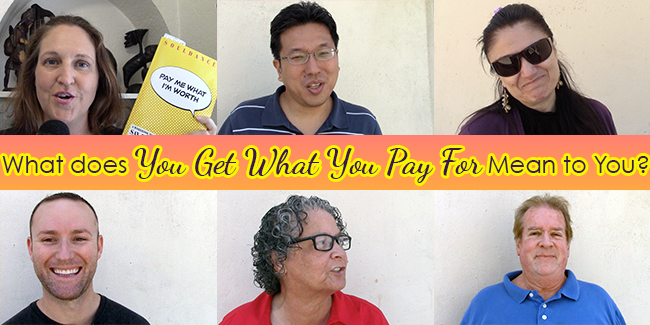If you’d like to listen to this post (minus the video), use the player below or listen on Spreaker.
Duration: 3:41
This is the seventh installment of my journey through Soul Dancer’s free Pay Me What I’m Worth course sampler. If you missed any shows, its all good! Click here to access the entire series.
Video Response
NOTE: The video content is separate and different from the audio/text content.
Chapter Six: You Get What You Pay For
At this point in the Pay Me What I’m Worth journey, we’ve completed the first half of the book, which is about preparing to receive. We’ve explored the concept of worth, how material possessions affect our perception of worth, how our skills affect our value, how to get out of the comparison trap, a technique for uncovering the golden insights found within the themes and trends of our lives and then pulled all that work together to gain an understanding of how it will help us grow our worth.
Now we enter into the second half of the book, which is about preparing to give. This first chapter digs into the meaning of the phrase, “You get what you pay for.” What does this phrase mean to you? I asked some friends to share what they thought it meant and got these responses:
Saji: “Nothing is free. … Especially when its in service. People won’t give you good service unless you pay for it.”
Crystal: “When you have a dent in your car, and the body shop says it’s going to be a $1,000. And a guy comes by you in a car and says, ‘Hey! I can fix that dent for $300!’ Guess what? You get what you pay for.”
Ryan: “Spending a little extra knowing that something will stretch a lot longer, maybe a pair of shoes that will last you one year instead of three months.”
Susan: “I’ve seen this practice so many times. My sister always goes cheap, and it doesn’t last…. You should pay the extra bit of money and that shirt will last, that pair of pants will last, those pair of shoes will last, that food will be more beneficial to your body.”
Rick: “It means a value on something. You cannot pay a cheap amount of money and expect high-class things. The best things in life are not free. You shell out a dollar, you’re going to get a dollar’s worth; you shell out a hundred, you’ll get a hundred dollars worth.”
I believe “you get what you pay for” has many layers of meaning.
On the one hand, as my friends mentioned many times above, it can be taken to mean that the more you pay for something, the higher the quality. However, there are exceptions to that idea. Is a $5 wooden spoon really better than a $1 wooden spoon? For most uses of a wooden spoon, I think not. Then again, there are times when paying more really does give you more. In my experience, this is so true of electronics. I paid top dollar for a stereo receiver nearly 10 years ago … it is still in very good shape and giving me high-quality sound. When I purchased stereos at a lesser cost, they didn’t last me nearly as long.
Then, as Soul mentions in the audio program for this chapter, you don’t always get what you pay for. Sometimes you’re paying extra for convenience … but is it worth it? For example, I went to an event and they were selling food and water at overly high prices. I paid $8 for a bottle of water and a luke-warm slice of cheese pizza. I would have rather paid $5 and brought my own healthy alternatives. But, they didn’t allow you to bring in outside food, so I was stuck. Did I get what I paid for … I think not. And what was worse, you could see the abuse the servers were getting from disgruntled attendees! I’m pretty sure those servers weren’t benefiting from the profit margin!
But this chapter isn’t about getting deals or crying over being taken. It is about understanding the balance of giving and receiving and how that relates to worth — our own, as well as how we value others.
The chapter opens up with a quote from Henry Wadsworth Longfellow: “We judge ourselves by what we feel capable of doing, while others judge us by what we have already done.”
How many times have you beaten yourself up because you knew you were capable of more? Did that self-lashing get you anywhere? Are you sure that you could have done more given the circumstances?
Much of what the exercise in Chapter 6 banks on is cleaning out your mental laundry with forgiveness. Forgiveness of others … for what is done, is done and why should you be caring all that baggage around? And forgiveness of yourself … you’ve done what you’ve done. How can you learn from those experiences to do better in the future?
Coming up in future installments of this journey:
- September 25 – Chapter 7: Pricing the Priceless
- October 9 – Chapter 8: Performance Based Contracts
- October 23 – Chapter 9: Ethics & Integrity
- October 30 – Chapter 10: Gratitude Guidelines


Carma! Awesome “in the field” reporting. Interesting how most folks go right to the dollar value related to worth. This ‘jump’ to ‘money’ as the sole ruler of one’s worth is exactly what we dissolve in our journey together. “Cost” comes in many forms. Time. Respect. Relationships. Health. The cost of a relationship – emotionally – may be far more “expensive” than simply writing a check.
I look forward to diving deeper into this in class! 12 lucky people are going to get a BARGAIN – thank you for providing 5 star value for 1 star prices!